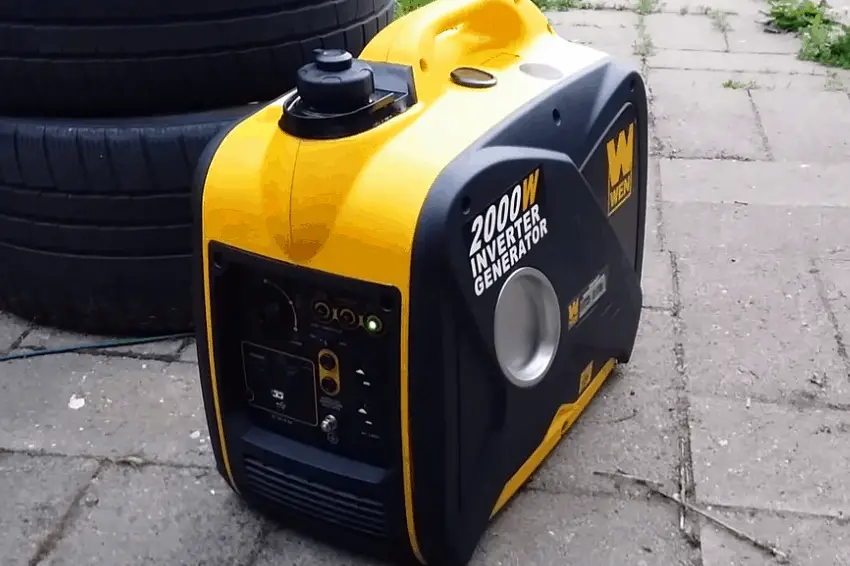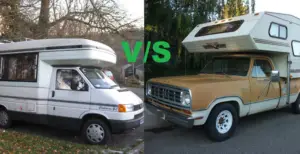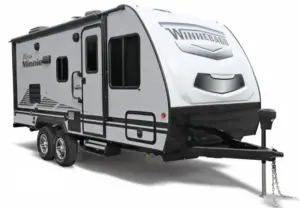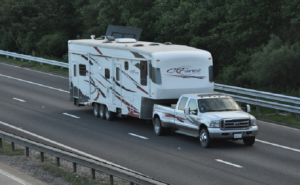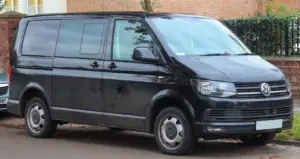Generators are a great way to provide power for your RV, whether you’re camping in the middle of nowhere or want to be prepared for a power outage.
But with so many different generators on the market, it can be tough to know which one is right for you. We’ve put together this list of the best RV generators under $1000.
We’ve considered factors like power output, fuel efficiency, and noise level to help you find the perfect generator for your needs.
1. Champion 3400-Watt Portable Inverter Generator
If you’re looking for a powerful yet portable RV generator, the Champion 3400-Watt Portable Inverter Generator is a great option.
It produces up to 3400 watts of power, making it great for running appliances or charging electronics.
It’s also fuel-efficient, with a run time of up to 7 hours on a full gas tank. And for added peace of mind, it comes with a 3-year limited warranty.
Features
- 3400 watts of power.
- Fuel-efficient.
- 3-year limited warranty.
- Weight: 120 pounds.
- Dimensions : 25.1 x 17.3 x 18 inches.
- Run time: 7 hours.
- Noise level : 68 dBA.
Pros of Champion 3400-Watt Portable Inverter Generator
- Powerful.
- Portable.
- Fuel-efficient.
Cons of Champion 3400-Watt Portable Inverter Generator.
- Heavy.
- Some customers have reported issues with customer service.
The Champion 3400-Watt Portable Inverter Generator is a great choice for RVers who need a powerful yet portable generator. - It’s fuel-efficient and has a run time of up to 7 hours, making it perfect for long weekends away from home.
2. Westinghouse WGen3600v Portable Generator – RV Ready
The Westinghouse WGen3600v is one of the best RV generators on the market.
It’s a robust and reliable unit that can provide your RV with all its power. Thanks to its user-friendly controls, the WGen3600v is also very easy to use. It is also very portable, so you can take it wherever you go.
Features
- 3,600 watts of power
- RV Ready
- User-friendly controls
- Very portable
- Weight: 96 lbs
- Dimension : 24.8 x 17.3 x 18.5 inches
- Run time : Up to 12 hours on a full tank of gas
- Noise level : 68 dBA
- Warranty : 3-year limited warranty
Pros
- Powerful and reliable
- It- Easy to use
- Very portable
- 3-year warranty
Cons
- Some users find the noise level to be too loud.
The Westinghouse WGen3600v is one of the best RV generators on the market. - It’s a powerful and reliable unit that can provide your RV with all its power. Thanks to its user-friendly controls, the WGen3600v is also very easy to use. Additionally, it’s very portable, so you can take it wherever you go.
3. Honda EU2200i Portable Generator – RV Ready
The Honda EU2200i is another excellent option for those looking for a portable generator to take with them on their RV adventures.
This unit is very lightweight and easy to transport, making it an excellent choice for those who want to be able to take their generator with them wherever they go. It also has a tiny footprint, so you won’t have to worry about it taking up too much space in your RV.
This generator is also very quiet, so you won’t have to worry about disturbing your neighbors when you’re using it. It’s also RV ready, so you can easily use it to power your RV’s appliances and electronics.
Features
- Very lightweight and easy to transport
- Has a small footprint
- Is very quiet
- RV ready.
- Dimensions : 19.9 x 11.4 x 16.7 inches
- Weight : weighs 46.5 pounds.
- Run time : run time of up to 8 hours.
- fuel tank capacity : 0.95 gallon
- Warranty : 3 year warranty.
- Noise level : 52 dBA
- Honda is a well-known and trusted brand, so you can be confident that this generator will be a great choice for your RV.
4. WEN 56200i Super Quiet Portable Inverter Generator
This is another great option for the best RV generators under $1000. It is very quiet and will not disturb your camping trip. It’s also very lightweight and easy to carry around. It also has a long run time and can power your RV for a long time.
Features.
- Quiet.
- Lightweight and easy to carry.
- Long run time.
- Can power your RV for a long time.
- Dimensions : 19.8 x 11.5 x 17.7 inches
- Weight : 52.9 pounds
- Run time : 12 hours
- Watts : 2000 watts.
- Noise level : 52 dB
Pros
- Very quiet.
- Lightweight and easy to carry.
- Long run time.
- Can power your RV for a long time.
Cons.
- May not be enough power for some RVs.
- These generators are great for RVs because they are quiet and have a long run time.
- They are also very lightweight and easy to carry around. The only downside is that they may not be enough power for some RVs.
Things to consider when buying an RV generator
When buying an RV generator, you need to consider a few things. The following are factors to keep in mind:
Size of the generator.
It would be best to make sure that the generator is the right size for your RV. If it is too small, it will not be able to power all of your appliances and devices. It will be more expensive and harder to carry around if it is too big.
Weight of the generator.
It would be best to make sure that the generator is not too heavy for you to carry. It won’t be easy to move around and set up if it is too heavy.
Run time of the generator.
It would help if you made sure that the generator has a long run time so that it can power your RV for a long time.
Noise level
You need to make sure that the generator is not too loud so that it does not disturb your camping trip.
Price.
When it comes to price, you get what you pay for. If you want a good RV generator, you need to be willing to spend a little more money. However, some great RV generators under $1000 will still give you the power and features you need.
Warranty of the generator.
You should always check the warranty before buying any generator. This will help you know if the company stands behind their product and if they will be there to help you if something goes wrong.
Return policy of the store.
You should always check the store’s return policy before buying any generator. This will help you know if you can return the generator if it does not work for you.
Reviews of the generator.
It would help if you always read the reviews of the generator before buying it. This will help you to know if other people have had good experiences with the generator and if it is worth the money.
Customer service of the company.
You should always check the company’s customer service before buying any generator. This will help you to know if they are easy to reach and if they are helpful.
Warranty.
You should always check the warranty of the company before buying any generator. This will help you to know if they stand behind their product and if they will be there to help you if something goes wrong.
Tips and tricks for using an RV generator
The following are some tips and tricks for using an RV generator:
- Make sure that the generator is the right size for your RV. If it is too small, it will not be able to power all of your appliances and devices. It will be more expensive and harder to store if it is too big.
- Choose a fuel-efficient generator. RV generators can run on either propane or gasoline. Propane is usually more expensive, but it lasts longer and is better for the environment.
- Make sure to read the owner’s manual carefully before using the generator. This will help you understand how to use it properly and avoid accidents.
- Never use the generator indoors. RV generators produce harmful fumes that can be deadly if inhaled. Always use them outdoors in a well-ventilated area.
- When not in use, make sure to store the generator properly. This includes keeping it clean and dry and away from any flammable materials.
- Be sure to maintain the generator regularly. This includes checking the oil and changing the filter.
- Always keep a spare set of generator keys if you lose the originals.
- Make sure to never run out of fuel. Keep a spare tank of propane or gasoline on hand so that you can refill the generator as needed.
- In a power outage, always contact your local utility company first to find out when power will be restored. Do not try to use the generator as a long-term solution.
- Never overload the generator. This can damage the engine and potentially cause a fire. Make sure only to operate appliances and devices within the wattage range of the generator.
You can ensure that your RV generator is used safely and effectively by following these tips.
What should you and should not expect?
When it comes to finding the best RV generators under $1000, you should not expect to find one that is both powerful and quiet. However, you can find some suitable for your needs if you know what to look for.
- The most important thing to consider is the wattage rating in terms of power output.
This will determine how much power the generator can output and how well it will handle appliances that use a lot of electricity. For example, if you want to use an RV air conditioner, you will need a generator with at least 2000 watts of power.
- Another important consideration is the type of fuel that the generator uses. Some generators can run on either gasoline or propane, while others can only run on one or the other.
If you plan to use the generator for long periods, it is essential to choose one that can run on both fuel types so that you do not have to worry about running out of one type.
- Another thing you should also consider is the size of the generator and how easy it is to move around.
Some generators are pretty large and can be challenging to move, so it is essential to choose one that is the right size for your needs. If you plan on using the generator in an RV, you will need to make sure that it fits comfortably inside the RV.
- Finally, it would help if you also considered the generator’s noise level.
Some generators are very loud, while others are much quieter. If you will be using the generator in an area where noise is a concern, it is important to choose one that is as quiet as possible.
How much power do I need?
The amount of power you need will depend on what you plan on using the generator for. If you are only going to be using it for basic needs, such as powering a few lights and charging your phone, you will not need as much power as someone who plans on using it to run an RV air conditioner.
What is the difference between gasoline and propane?
The main difference between gasoline and propane is that gasoline is more flammable than propane. This means that it is important to be more careful when using a gasoline generator, as there is a greater risk of fire. Propane is less flammable, but it is also more expensive.
How long will the generator last?
The lifespan of a generator depends on how often you use it and how well you maintain it. If you use it regularly and keep up with maintenance, it can last for many years. However, if you only use it occasionally or do not maintain it properly, it will not last as long.
How much noise does the generator make?
The amount of noise a generator makes depends on the model and brand. Some generators are very quiet, while others can be quite loud. If noise is a concern, it is important to choose a quiet generator as quiet as possible.
How difficult is it to move the generator?
The difficulty of moving a generator depends on its size and weight. Some generators are quite large and can be difficult to move, while others are much smaller and easier to transport. If you plan on using the generator in an RV, you will need to make sure that it is easy to move.
Conclusion
This informative article provided the reader with information on what to consider when searching for the best RV generators under $1000.
It is important to consider the generator’s power output, fuel type, size, and noise level. It is also essential to think about how easy it is to move the generator. By taking all of these factors into consideration, you can be sure to find the best generator for your needs.

